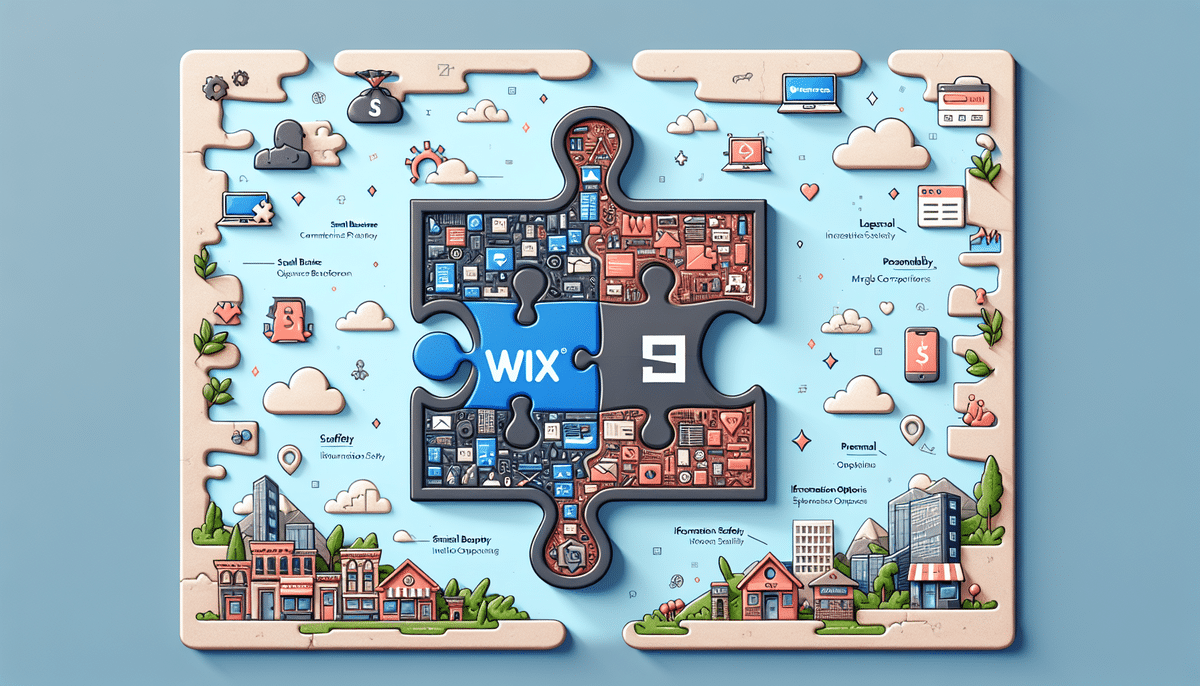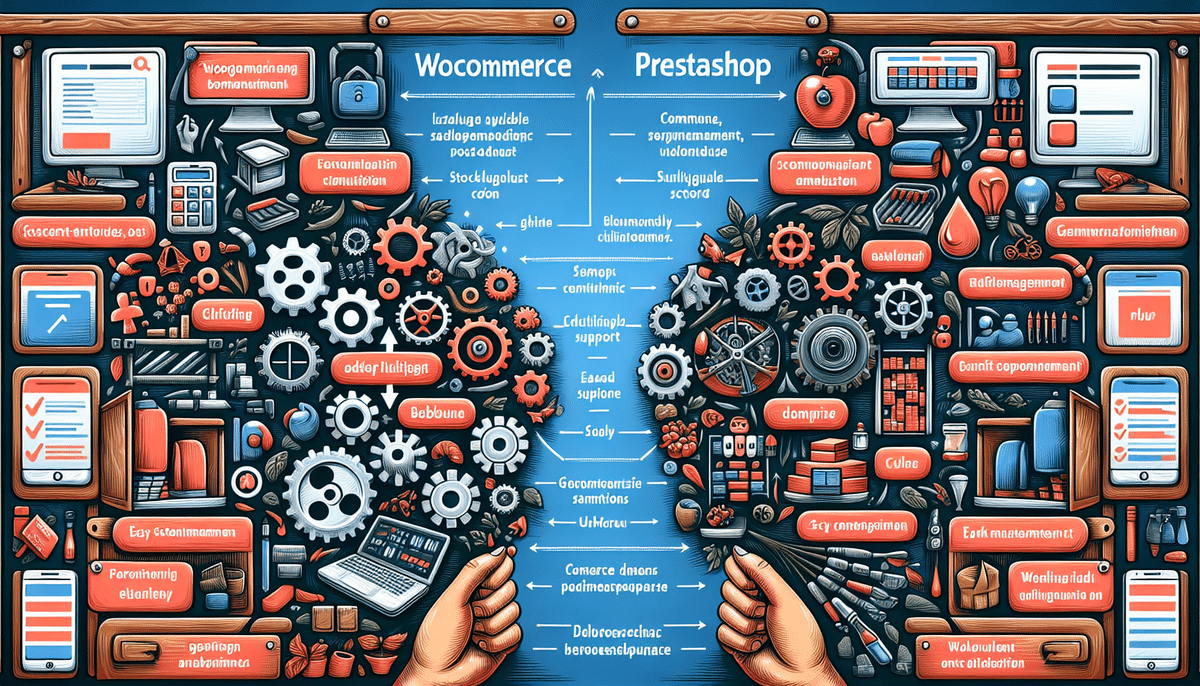Wix eCommerce vs PrestaShop: Comprehensive Platform Comparison
Choosing the right eCommerce platform is crucial for the success of your online store. Two popular options, Wix eCommerce and PrestaShop, offer distinct features and benefits tailored to different business needs. This article provides an in-depth analysis of both platforms, comparing their pricing, usability, customization options, SEO capabilities, mobile responsiveness, payment integrations, security features, and customer support. By the end, you'll have a clear understanding of which platform aligns best with your business objectives.
Overview of Wix eCommerce and PrestaShop
Wix eCommerce is a user-friendly website builder integrated with robust eCommerce functionalities. It is ideal for small to medium-sized businesses seeking an all-in-one solution with minimal technical requirements. Wix offers drag-and-drop tools, a variety of customizable templates, and built-in features like product pages, shopping carts, payment processing, and shipping management.
PrestaShop, an open-source platform, caters to businesses that require greater flexibility and control over their online store. It is highly customizable, allowing for extensive modifications through a wide range of modules and themes. PrestaShop is suitable for businesses with technical expertise or access to development resources, offering advanced features like product management, order management, detailed analytics, and comprehensive SEO tools.
Key Features and Benefits
Wix eCommerce Features
- Drag-and-Drop Builder: Easily design your store without any coding knowledge.
- Customizable Templates: Choose from over 500 templates tailored for various industries.
- Integrated Payment Gateways: Supports PayPal, Stripe, and more.
- SEO Tools: Built-in SEO wizard to optimize your site for search engines.
- Marketing Integrations: Email marketing, social media integrations, and more.
- Mobile Optimization: Responsive designs ensure your store looks great on all devices.
PrestaShop Features
- Open-Source Flexibility: Complete control over your store’s design and functionality.
- Extensive Modules and Themes: Access to thousands of add-ons for enhanced features.
- Advanced Product Management: Manage unlimited products with detailed attributes.
- Comprehensive Analytics: Detailed reports to track your store’s performance.
- Multilingual Support: Easily manage multiple languages and currencies.
- Community Support: Active community contributing to continuous improvements.
Pricing Comparison
Wix eCommerce offers a variety of pricing plans to cater to different business sizes:
- Business Basic: Starting at $23/month, includes essential eCommerce features.
- Business Unlimited: $27/month, adds more advanced features like subscriptions.
- Business VIP: $49/month, offers priority support and more comprehensive tools.
It's important to note that Wix also provides a free plan with limited features, suitable for testing and small-scale operations.
PrestaShop is free to download and use, aligning with its open-source nature. However, additional costs include:
- Web Hosting: Ranges from $5 to $50 per month depending on provider and plan.
- Domain Registration: Approximately $10-$15 per year.
- Modules and Themes: Prices vary, with premium modules and themes costing between $30 and $300.
- Development Costs: If custom development is needed, costs can escalate based on project complexity.
According to a Statista report, PrestaShop is favored by businesses that anticipate scaling and require tailored solutions, justifying the initial investment in customization and hosting.
Ease of Use and Customization
Wix eCommerce Usability
Wix is renowned for its intuitive interface, making it accessible to users with no technical background. The drag-and-drop builder allows for effortless customization, enabling users to create visually appealing stores swiftly. Additionally, Wix’s App Market offers numerous apps to extend functionality without the need for coding.
PrestaShop Customization
PrestaShop offers unparalleled customization options due to its open-source framework. Users can modify the core code, integrate custom modules, and design unique themes to meet specific business requirements. However, this level of customization typically requires technical expertise or the assistance of a developer, which can be a barrier for non-technical users.
SEO, Mobile Responsiveness, and Security
SEO Capabilities
Wix eCommerce provides built-in SEO tools, including customizable meta tags, URL optimization, and an SEO wizard to guide users through optimizing their site. According to Search Engine Journal, recent updates have significantly improved Wix’s SEO performance, making it a viable option for businesses focused on organic search growth.
PrestaShop offers advanced SEO features, allowing for detailed customization of URLs, meta descriptions, and image alt tags. Its open-source nature means businesses can implement comprehensive SEO strategies, including integrating with third-party SEO tools. Studies by Data Driven Investor highlight PrestaShop’s superior flexibility in handling complex SEO requirements, which is advantageous for larger enterprises.
Mobile Responsiveness
Both platforms offer mobile-responsive designs. Wix eCommerce ensures that all templates are automatically optimized for mobile devices, providing a seamless shopping experience. PrestaShop also supports responsive themes and allows businesses to customize their mobile storefronts extensively.
Security Features
Security is paramount for eCommerce platforms. Wix eCommerce includes SSL certificates, automatic updates, and robust security protocols to protect customer data. PrestaShop also offers SSL support and additional security modules, such as two-factor authentication and advanced server-side security measures. According to PrestaShop’s official security page, these features help safeguard against various cyber threats, making it a secure choice for businesses handling sensitive information.
Payment Gateway Integration and Customer Support
Payment Gateway Integration
Wix eCommerce supports a range of popular payment gateways, including PayPal, Stripe, and Square. The integration process is straightforward, allowing businesses to start accepting payments quickly. Additionally, Wix handles compliance with major security standards, simplifying the payment process for users.
PrestaShop offers extensive payment gateway options through its marketplace, including PayPal, Stripe, Authorize.Net, and regional payment solutions. While the integration is flexible, setting up certain payment gateways may require technical adjustments, especially for specialized or localized options.
Customer Support
Wix eCommerce provides comprehensive customer support through 24/7 live chat, phone support, and a detailed knowledge base. Paid plans offer priority support, ensuring timely assistance for urgent issues.
PrestaShop relies primarily on community support through forums and user groups. While this fosters a collaborative environment, businesses may need to seek professional support from certified PrestaShop developers for more complex issues. Additionally, PrestaShop offers official support packages for an added cost, which can provide more direct assistance.
Pros and Cons
Wix eCommerce
Advantages:
- User-friendly interface with drag-and-drop functionality.
- Affordable pricing plans suitable for small to medium businesses.
- Comprehensive built-in eCommerce features.
- 24/7 customer support with multiple contact options.
Disadvantages:
- Limited customization compared to open-source platforms.
- Transaction fees can accumulate with high sales volumes.
- Less control over advanced SEO and site functionality.
PrestaShop
Advantages:
- High level of customization and flexibility.
- Scalable to accommodate growing businesses.
- Advanced security features for data protection.
- Extensive range of modules and themes.
Disadvantages:
- Requires technical expertise or developer resources.
- Additional costs for hosting, domains, and premium modules.
- Customer support is less comprehensive without official packages.
Conclusion: Which eCommerce Platform Is Best for Your Business?
The decision between Wix eCommerce and PrestaShop ultimately depends on your business needs and resources. If you prioritize ease of use, affordability, and comprehensive support, Wix eCommerce is a strong contender, especially for small to medium-sized businesses or those new to online selling.
Conversely, if your business requires extensive customization, scalability, and advanced features, and you have access to technical expertise, PrestaShop offers a flexible and powerful solution. It is particularly well-suited for medium to large enterprises looking to create a unique and highly functional online store.
Evaluate your specific requirements, budget, and long-term goals to choose the platform that best aligns with your eCommerce strategy. Both Wix eCommerce and PrestaShop have proven track records of helping businesses thrive in the competitive online marketplace.




















